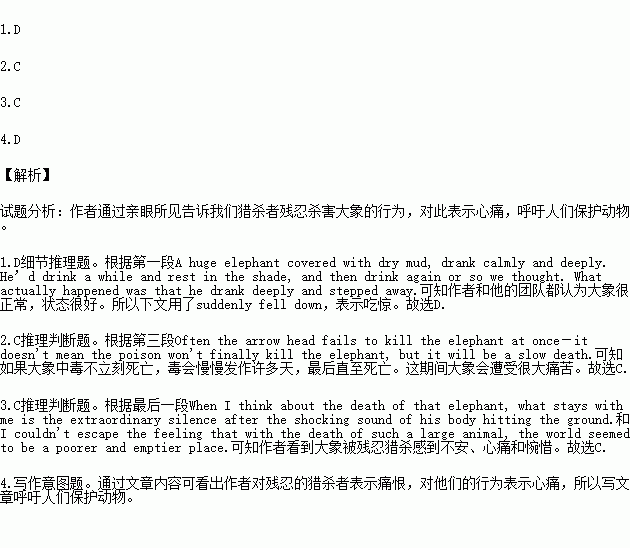题目内容
I went to the Tsavo National Park in northern Kenya for a film. We set off early for a distant water hole. A huge elephant covered with dry mud, drank calmly and deeply. He might have traveled 50 km to reach the water. He wasn’t going to hurry now. He’d drink a while and rest in the shade, and then drink again or so we thought. What actually happened was that he drank deeply and stepped away. Then he suddenly fell down. Within minutes he was dead.
We called animal doctor Jeremiah Poghon immediately. He removed the head of a poisoned arrow from the elephant’s body, and let out over 100 liters of pus (胺)-the result of the elephant’s meeting with a poacher(偷猎者)months before.
Today's poacher shoots from a blind. He fires an arrow, covered with poison, into the body of an elephant. If the poacher is lucky, the elephant might die in an hour or two; if not, he might have to follow the elephant for days before it dies. Often the arrow head fails to kill the elephant at once-it doesn't mean the poison won't finally kill the elephant, but it will be a slow death.
Living in Tsavo through these times, I could see the results of poaching from time to time. When I think about the death of that elephant, what stays with me is the extraordinary silence after the shocking sound of his body hitting the ground. I took some comfort from the knowledge that as the dead body returned to the soil, some animals would benefit-but I couldn't escape the feeling that with the death of such a large animal, the world seemed to be a poorer and emptier place.
1. While filming near the water hole, the author and his team ________.
A. knew the elephant was injured
B. found the elephant acted violently
C. tried their best to save the elephant
D. thought the elephant was in good condition
2. Further examination showed that the dead elephant________.
A. had suffered an hour or two
B. was killed by a poisonous needle
C. had suffered a lot
D. had had a good fight with a poacher
3. How does the author feel when thinking about the elephant s death?
A. empty. B. comfortable.
C. upset. D. relieved.
4. Why did the author write the text?
A. To introduce African elephant.
B. To show the cruelty of poaching.
C. To describe his filming experience.
D. To ask readers to protect wild animals.
 名校课堂系列答案
名校课堂系列答案
